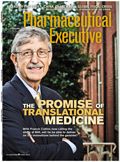Accelerated Evolution
Adapting training techniques is necessary to thrive in the fact-changing dynamic of a physician's office
Many years ago, Charles Darwin said, "It is not the strongest of the species that survives, but the one that is the most adaptable to change." Today, the same can be said of pharma's sales force. Survival is no longer about power and numbers. It is about adaptability.

Scott Moldenhauer
For many years, there has been talk about upgrading pharma's sales force. In many ways, these upgrades are under way. Representatives are learning more about the increasingly complex forces shaping healthcare decisions, and sales reps also have access to more customer data than ever before. In other ways, however, there has been failure. Sales efforts continue to be thwarted by limited face time with physicians, managed care hurdles, and physician access restrictions. But there are new ways to help representatives adapt to the new selling environment.
Perfect the Hallway Call
Hallway calls represent a tremendous opportunity for sales organizations. These calls generally last two minutes or less, occur between patient visits, and account for up to 75 percent of the representative's day. While hallway calls provide less than ideal selling situations, they have become a permanent part of the selling environment. Hallway calls are here to stay, and sales leaders who can help representatives improve the effectiveness of hallway calls will reap big rewards.
Most hallway calls leave much to be desired. According to recent data, most representatives neither deliver a core message during hallway calls, nor do they display other fundamental sales behaviors desired by their companies. Most often, they talk about samples or upcoming speaker programs.
To understand why this happens, put yourself into the shoes of a sales representative. You are standing in a busy hallway waiting for the doctor to exit an exam room. As you wait, you realize that there are three patients in exam rooms and the doctor is running 20 minutes behind. You begin to ask yourself questions: Is this a good time? Should I bring up my product? Will I upset the doctor? In the end, you pass on the opportunity and move on to your next office.
Sales trainers can increase both the quality and frequency of hallway calls by helping representatives eliminate anxious hesitation. To do this, training departments must show sales representatives how to deliver calls briefly and in a way that makes both physician and representative comfortable.
The payoff for training successful hallway calls can be enormous. A representative who A) confidently strives for hallway interactions; B) possesses the ability to create hallway product discussions; and C) knows how to deliver a concise—yet effective—message can provide significant sales increases for any organization.
Tweak the Selling Model
For many years, pharmaceutical companies have relied on selling models adopted from other industries. Until recently, these models worked. However, in the early 1990s, when physicians had less time to meet with sales representatives, consultative and other "long-sell" models became less effective.
Today's selling models fail to provide representatives with adequate guidance during brief physician interactions. Trying to cram a consultative sell into a quick hallway call is like trying to force a square peg into a round hole. It doesn't work, and it angers physicians. A more flexible selling model is desperately needed, and modern advances in consumer psychology point the way.
Consider the work of Dr. Shelly Chaiken and her colleagues at New York University. According to Chaiken, the pace of modern medicine has forced physicians to use a different set of criteria to judge products. In the past, when physicians had more time, they wanted to know about studies. They scrutinized data. Today's physicians are increasingly forced to rely on a more efficient set of mental criteria. Psychologists now know a great deal about these criteria, and new selling models have emerged from their work.
In essence, the work of Chaiken and other psychologists stimulated 30 years of research into "short call" models. While beyond the scope of this article, these models offer two distinct advantages. First, because they are in sync with the way physicians make decisions in fast-paced environments, new models offer more effective selling systems. Second, new models offer the flexibility of adjusting to shorter time frames, thereby making physicians more satisfied with representative interactions.
When implemented in the field, sales leaders find that new models blend nicely with existing models. Training directors, for example, are able to maintain the core structure and philosophy of their current selling systems while integrating critical elements of newer systems. Ultimately, sales performance is enhanced.
Put an Emphasis on Access
An updated sales model is one step toward improving pharma's sales force, but it's not enough. Access continues to be a hurdle. According to SK&A, up to 50 percent of physician offices now restrict representative access. The key word is restrict. Most physicians are neither completely open nor completely closed to representatives but somewhere in between. This means that representatives with access skills can improve sales by reaching more high-prescribing physicians.
To date, pharma has addressed the access challenge by either A) telling their representatives, "Go where the doctors will see you;" or B) providing representatives with nebulous instructions such as, "Implement the total office call." This is not enough, and minor changes to sales representative training can lead to significant improvements in access.
In office-based settings, training needs to be focused on three points of contact:
1) How does the rep get beyond the gatekeeper?
2) How does the rep get beyond secondary gatekeepers, including nurses and offices managers? and
3) How does the representative engage the physician in meaningful product discussions?
The good news is that access can be taught and learned. In fact, when you look at the behavior of the best representatives, you find that they successfully access many physicians that average representatives cannot. Moreover, they use a common set of strategies to do so. These strategies can be systematically learned, trained, and coached.
Randomize Field Rides
While a great coaching tool, field rides fall short when it comes to helping representatives adapt to the new selling environment. The reason for this is lack of randomization. Over and over again, sales representatives take their managers to the same subset of offices within their territories. These offices are almost always open access and representative friendly. Sales representatives refer to these offices as "milk runs." They offer easy opportunities to impress managers.
While most companies feel that this practice is acceptable, there is a hidden detriment. When representatives know their managers will not be asking to visit their most challenging offices, performance in these offices lacks during ordinary visits.
One way to help sales representatives adapt to the new selling climate is to randomize field rides. When representatives know that managers will be visiting all of their offices, things begin to change. Calls that were once nothing more than a sample drop become filled with a purpose (if nothing more to impress the manager on upcoming visits). Suddenly, knowing names, understanding office dynamics, and consistently accessing the physician is a priority. Ultimately, market share begins to improve, and representatives learn to adapt.
This approach comes with a caveat. In difficult offices, initial standards for success need to be relaxed. Progress should be measured in gradual steps. For example, initial success means that the representative has an understanding of office dynamics and has created allies with key office personnel; secondary success means that the representative consistently details the nurse, accesses the physician, and delivers a successful sales call.
In the end, representatives who succeed in their most challenging offices learn skills that can be used in all of their offices.
Scott Moldenhauer is president of Persuasion Consultants. He can be reached at scott@persuasionconsultants.com

The Misinformation Maze: Navigating Public Health in the Digital Age
March 11th 2025Jennifer Butler, chief commercial officer of Pleio, discusses misinformation's threat to public health, where patients are turning for trustworthy health information, the industry's pivot to peer-to-patient strategies to educate patients, and more.
Navigating Distrust: Pharma in the Age of Social Media
February 18th 2025Ian Baer, Founder and CEO of Sooth, discusses how the growing distrust in social media will impact industry marketing strategies and the relationships between pharmaceutical companies and the patients they aim to serve. He also explains dark social, how to combat misinformation, closing the trust gap, and more.